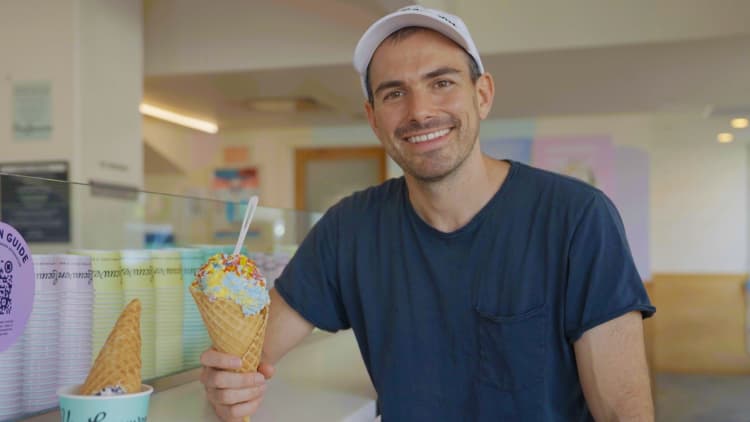
Fiona Afshar has written software, worked as a florist and raised three kids. She never thought she’d cook for money.
Growing up in Iran, she was taught food meant love. “The more we feed you, the more we love you,” Afshar, 57, tells CNBC Make It. In 2018, she started her Instagram @cookingwithfiona, specifically to post instructional cooking videos she’d filmed for her daughter.
Within months, Afshar grew a following. She had recently discovered how malleable pasta dough was, and posted videos of herself designing, cooking and serving brightly colored, loudly patterned noodles. Viewers were hooked. Cooking classes, brand partnerships and an online shop called Fiona’s Pasta followed.
Afshar thinks her audience is drawn to her eccentric noodles for one simple reason: “If you look at every culture closely, there’s always a form of pasta. It just like leaves a really warm feeling [of] comfort.”
Fiona Afshar makes $129,000 per year, primarily from selling colorful pasta boxes out of her home kitchen in Malibu, California.
Tristan Pelletier
Five years into her cooking business, food still means love to Afshar — but now, she gets paid for it, and shares her love with nearly half a million followers. She brought in $129,300 last year, primarily from making pasta and shipping it out of her home in Malibu, California, according to documents reviewed by CNBC Make It.
Here’s how Afshar created her pasta business — almost by accident.
A lifelong love of cooking
When Afshar was 9 years old, at the start of the Iranian Revolution, her dad moved her and her three brothers to the U.K. Then, he left to go back for their mother.
Her mother had given her a cookbook, and every night, Afshar ran her fingers over the recipes, memorizing them as a source of comfort. Her parents joined the siblings six months later, but her deep connection with food remained. It was how she was taken care of, and how she learned to take care of others, she says.
Afshar still has the cookbook her mother gave her before she emigrated from Iran to the U.K. at 9 years old.
Tristan Pelletier
After graduating college, Afshar moved to California and worked as a software writer and consultant. She met her husband Ali in 1987, and started a software business with him before retiring to raise their three children.
Except for a brief stint as a florist, Afshar didn’t work until her oldest daughter went to college. She devoted her creative energy to mastering healthy and interesting meals for her family, she says.
Shortly after she started her Instagram account, she started making pasta from chef Thomas Keller’s tutorials — and her followers ate it up.
“As soon as I started posting pasta, the whole social media went viral,” she says. “I’m like, ‘OK, you guys want pasta? I’ll give you more pasta.'”
A homegrown business
In 2020, Afshar started hosting virtual pasta-making classes for $35 per person. She still wasn’t in it for the money, but missed hosting and cooking for other people during the pandemic, she says. At the venture’s peak, 100 people attended per class, with folks joining from all over the world, she adds.
The following year, Afshar’s brother suggested that she sell her creations. When she resisted, he gave her a proposal: Let’s open a Shopify store for one month, and if you hate it, we’ll close it.
Together, they launched the virtual store, called Fiona’s Pasta. “As soon as he opened shop for me, it’s like ding, ding, ding. Sales started coming in,” she says. “I’m like, ‘Are you kidding me? People are actually paying $100 for pasta?'”
Around the same time, luxury fashion retailer Ssense reached out to Afshar, a lifelong fashion lover, about a collaboration. They’d pay her to design pasta that corresponded with the logos and style of brands like Gucci and Anthropologie, and post videos featuring those pastas on social media.
Those types of branding deals now make up a good chunk of Afshar’s income: Last year, they made her about $18,000. Teaching virtual classes made her an additional $16,500.
Her largest source of pasta income, however, is from her shop. She sells boxes of colorful, floral and designer-based pasta anywhere from $80 to $240 on her website.
Keeping things in the family
Afshar says she works about 32 hours per week making, packaging and shipping her pasta out of her home. She spends $0 on advertising, and has her mother and brother’s mother-in-law help her roll, cut and dry the dough. They refuse to be paid, Afshar says.
“Fiona’s Pasta, Cooking with Fiona, it’s more of a passion,” Afshar says. “We’re not relying on the income of it.”
Afshar uses fresh ingredients, like parsley and beets, from a local market to give her pasta vibrant colors, she says.
Tristan Pelletier
Despite bringing in six figures per year, Afshar insists that her business’s purpose is to connect with people through food and pass some of her culture to her children. She has no plans to expand her pasta-making or classroom teaching beyond her kitchen.
“It just has so much potential to grow so big, but in a way, I’m holding it as a baby,” she says. “It’s so personal. It’s my art … I don’t want to take it somewhere [to] mass produce it. I think it would lose its essence.”
DON’T MISS: Want to be smarter and more successful with your money, work & life? Sign up for our new newsletter!
Get CNBC’s free Warren Buffett Guide to Investing, which distills the billionaire’s No. 1 best piece of advice for regular investors, do’s and don’ts, and three key investing principles into a clear and simple guidebook.
